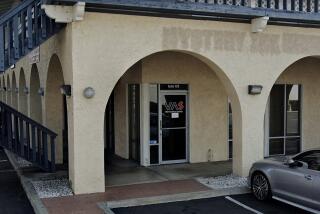Keating’s Misuse of Funds Alleged : Lincoln S&L;: Investors to file suit, charging that the executive converted debt holder money to his own use. They also accuse him of transferring millions overseas.
- Share via
Small investors in American Continental Corp. plan to sue Charles H. Keating Jr. to freeze what they say is more than $100 million that he has put into foreign investments and bank accounts--money gleaned through transactions involving Irvine-based Lincoln Savings & Loan.
The immediate aim of the class-action suit is to gain access to Keating-controlled money in Switzerland, the Bahamas and Panama, said Joseph W. Cotchett Jr. of Burlingame, one of the lawyers for the investors. The suit--a copy of which was obtained by The Times--will restate the racketeering and fraud allegations that debt holders have made in another lawsuit that also is pending.
The new legal action is expected to be filed either today or Tuesday in U.S. District Court in Los Angeles. It alleges that Keating and his family unlawfully converted debt holder funds over two years to their own use by transferring money out of the country.
Spokesmen for Keating--chairman of Phoenix-based American Continental Corp., parent company of Lincoln Savings--denied that Keating or any of his executives engaged in any fraudulent activities involving overseas accounts.
The suit contains details of alleged transactions that federal S&L; regulators did not know before they seized Lincoln on April 14, a day after American Continental filed for bankruptcy protection.
Among the allegations in the suit are claims that:
--Keating’s son set up a foreign currency trading company in Zurich, Switzerland, and Dusseldorf, West Germany, and paid it $20 million for “unknown reasons.” The payment to Gesellschaft Fur Trend Analysen, the suit alleges, was designed to cover up a transfer of money for Keating.
--Keating caused Lincoln to pay $25.5 million to DIA Holdings Overseas, a Netherlands company, for reasons that “have never been explained.”
--Keating used $17.5 million in a Lincoln subsidiary’s funds to invest in a trading company called Trendinvest Ltd., in the Bahamas, where Keating has a home. The suit claims that “millions of dollars” were funneled through the Bahamian firm in “supposed losses” before Trendinvest bought back the subsidiary’s investment.
--Keating “channeled” more than $10 million in Lincoln funds to Southbrook Holdings, a Panamanian firm whose existence regulators have said they learned about only a month ago.
--Keating has bank accounts in six foreign banks in Europe.
Allegations about the Panama and Bahamas firms were raised three weeks ago when federal regulators testified before the House Banking, Finance and Urban Affairs Committee, which is looking into the collapse of Lincoln. The Lincoln bailout is expected to be one of the biggest ever, costing taxpayers an estimated $2 billion.
Regulators also told the House committee that a Lincoln subsidiary paid $17 million to Credit Suisse Bank to arrange the purchase by Kuwaiti investors of a 45% interest in Lincoln’s Phoenician Resort in Scottsdale and Crescent Hotel in Phoenix.
American Continental spokesmen said that the allegations in the lawsuit are based on faulty information and would not amount to wrongdoing anyway.
For example, they said, the investment in Trendinvest resulted in a small profit and the Panama deal has been blown out of proportion, mainly by the comments of Rep. Henry B. Gonzalez (D-Tex.), the House Banking Committee chairman, who had said that he wasn’t surprised “Keating eventually found Gen. Manuel Noriega,” the Panamanian dictator.
The parent firm’s spokesmen said that Lincoln put $6,500 in an escrow account it controlled as it considered investing in Southbrook Holdings, an investment advisory firm. But the deal was never completed and the escrow money was returned to Lincoln, they said.
The plaintiffs in the class-action suit consist of investors who bought $250 million in debt securities, including nearly 22,000 people who bought almost $200 million in non-rated, high-risk securities at Lincoln’s 29 Southern California branches. Many of the latter group were elderly depositors who believed that their investments were insured.
The small investors have filed more than half a dozen class-action lawsuits in state and federal courts since April. Most of them allege that Keating and his associates were engaged in racketeering and fraudulently took their money. In addition, federal regulators have filed a civil racketeering suit against Keating and six of his executives.
More to Read
Inside the business of entertainment
The Wide Shot brings you news, analysis and insights on everything from streaming wars to production — and what it all means for the future.
You may occasionally receive promotional content from the Los Angeles Times.










